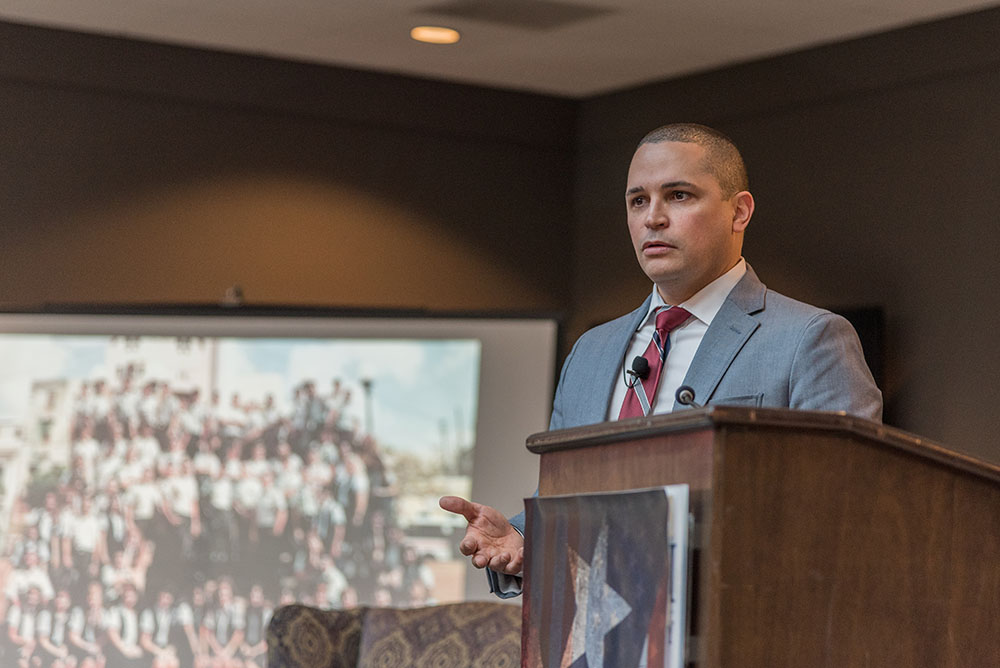“Social justice is like building a cathedral,” said Northampton Community College Professor Javier Ávila, the 2015 Pennsylvania Professor of the Year and keynote speaker for Cabrini Day 2017. “You’re working toward something, and you might not live to see the finished product, but that doesn’t mean you’re going to stop working on it. The next generation will work on it, and then the next generation, until you have something beautiful.”
In his presentation, “The Trouble With My Name,” Ávila expounded on Connecting Through Culture, the theme of this year’s Cabrini Day, an annual celebration of heritage and mission honoring Cabrini’s namesake, Saint Frances Xavier Cabrini.
Ávila’s race- and culture-themed presentation included poetry readings focusing on poignant messages of stereotypes, misguided “truths,” and acceptance.
“Race is a fallacy,” said Ávila. “Most of my life, I was white. If you are born and raised in Puerto Rico, you stay on the island, and you are this skin tone or lighter, you are considered white. Everybody tells you that you are white, and you believe it.”
It wasn’t until Ávila came to the mainland U.S. to attend graduate school in Pennsylvania that he realized not everyone saw him the way he viewed himself. It was then, said Ávila, that the “bubble of race” burst.
“You know that it is bad to judge others based on the color of their skin, but that’s a theory. In practice, to become a minority and truly understand what racism is, that’s not something I truly experienced until I moved to the mainland U.S. That’s when I understood that race is a fallacy. Of course we’re all different, but we’re all the same. How is it possible that I can be brown one day, white the next day, and still be exactly the same person with the same values?”
Another “bubble” that burst for Ávila? The bubble of language.
Ávila’s father, who was fully bilingual and loved English, wanted Ávila to speak English fluently, and, to that end, enrolled him in a military Catholic private school at a young age.
“I thought everyone in Puerto Rico was fully bilingual like I was,” said Ávila. “I went to the University of Puerto Rico, and started to speak Spanglish, and my classmates made fun of me. ‘You think you are an American, speaking English like that?’ they said.
“An accent happens when you learn another language after the ideal language acquisition age, which is between infancy and 12. It’s a biological reality, and it’s OK. Most multilingual people are not prejudiced against people with accents and do not equate an accent with intellectual inferiority.
“I thought, foolishly, if people don’t appreciate me speaking another language here, surely, in Pennsylvania, they will. But what happens if you have this skin tone and you speak Spanish where you shouldn’t? Trouble happens.”
Ávila expounded upon this trouble in a reading of his poem “Denied Service,” the poem’s title a double entendre. “Upon being heard speaking Spanish at the entrance of a restaurant in Hazleton, PA,” begins the poem, before Ávila powerfully questions whether he should have told the server about his father’s military service and resulting nightmares, his uncle’s loss of limbs in Vietnam, his cousin’s military service, his own JROTC experience and that he now teaches English to native English speakers, “when she called me a foreigner.”
“I did not understand what minority problems were,” said Ávila. “One of them is that you have to often prove to the majority that you are not the stereotype that they have of you, and that can be exhausting.”
Ávila recounted his neighbor mistaking him for a landscaper and asking him to provide an estimate when Ávila and his family first moved into their house.
“Sometimes you want to remove the ‘Puerto Rican-ness’ and just be treated normally, but you can’t. You can’t wash it away. Sometimes you just have to explain, or you can use comedy for it, but there’s always something.”
There is even explanation required in something as simple as a name, said Ávila. “Puerto Ricans have a lot of names. Puerto Rican women don’t take their husbands’ last names,” he explained. Between the sheer length of the names, and the pronunciation, “The trouble with your name begins,” he said. “Now you are being judged.”
Is his poem “Accent,” Ávila touches upon the difficulty of including accent marks in American language, printing, and documents.
Out here, the accent mark does not exist.
It is an imposition, a reminder of something all too distant.
Ávila described his poem “The Trouble With My Name” as a “collection of mispronunciations and misspellings of my name over the last 12 years.”
You see, I like that they have options,
that they can be creative,
that they will bravely forego
looking it up or asking the person
who has had the name for forty years or so.
Despite the ironies and injustices Ávila has faced in the mainland U.S., he ultimately bears a message of hope. In his poem “Bloodline,” written to his son, Oscar, he pays tribute to the converging cultures of Oscar’s four great-grandmothers and how their individual roots have paved the way for the person Oscar is today. “To me, history begins with wonderful women,” said Ávila. “To me, ‘Bloodline’ is what America represents.
“We can teach others about privilege without making people feel guilty,” said Ávila. “There’s a difference between equality and equity: Equality means treating everyone equally, equity means I’m going to give you the tools to be treated fairly. We need to give people the tools when they are unable, and giving them the tools to do that benefits all of us.”
For more on Cabrini Day 2017, including poster and presentation winners, please see our Cabrini Day 2017: Connecting Through Culture article.
